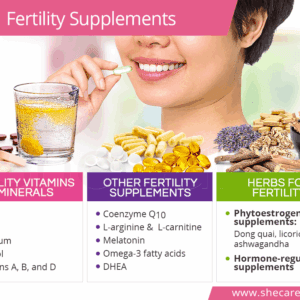During pregnancy, a woman’s nutritional needs change to support the health and development of her growing baby. A well-balanced diet is essential, but sometimes it can be challenging to get all the necessary nutrients from food alone. Vitamins and supplements can help fill the gap, ensuring a healthy pregnancy and reducing the risk of complications. Certain vitamins play a crucial role in fetal development and maternal health, and knowing the best ones to take can be overwhelming. Here are the most important vitamins for pregnancy health and their benefits.

Essential Nutrients for a Healthy Pregnancy
During pregnancy, a woman’s body undergoes significant changes to support the growth and development of the fetus. A well-balanced diet rich in essential nutrients is crucial for maintaining the health of both the mother and the baby. Vitamins and minerals play a vital role in ensuring a healthy pregnancy, and some are more critical than others.
Role of Folic Acid in Pregnancy
Folic acid is one of the most critical vitamins for pregnancy health. It helps prevent birth defects of the baby’s brain and spine. The recommended daily intake of folic acid during pregnancy is 600-800 micrograms. Foods rich in folic acid include leafy greens, legumes, and fortified cereals.
| Food Sources | Folic Acid Content (mcg) |
|---|---|
| Spinach (1 cup cooked) | 260 |
| Black beans (1 cup cooked) | 256 |
| Fortified cereal (1 serving) | 400-600 |
Importance of Iron During Pregnancy
Iron is another essential nutrient during pregnancy, as it supports the production of red blood cells for both the mother and the baby. The recommended daily intake of iron during pregnancy is 27 milligrams. Iron-rich foods include red meat, poultry, fish, and fortified cereals.
| Food Sources | Iron Content (mg) |
|---|---|
| Clams (3 oz cooked) | 28 |
| Beef liver (3 oz cooked) | 5 |
| Fortified cereal (1 serving) | 10-18 |
Calcium and Vitamin D for Fetal Development
Calcium and Vitamin D are crucial for the development of the baby’s bones, teeth, and muscles. The recommended daily intake of calcium during pregnancy is 1,000 milligrams, while the recommended daily intake of vitamin D is 600 IU. Foods rich in calcium include dairy products, leafy greens, and fortified plant-based milk.
| Food Sources | Calcium Content (mg) | Vitamin D Content (IU) |
|---|---|---|
| Milk (1 cup) | 300 | 100 |
| Yogurt (1 cup) | 300-400 | 100 |
| Fortified plant-based milk (1 cup) | 300-400 | 100-150 |
Omega-3 Fatty Acids for Brain and Eye Development
Omega-3 fatty acids, particularly DHA, play a vital role in the development of the baby’s brain and eyes. The recommended daily intake of DHA during pregnancy is 200-300 milligrams. Foods rich in omega-3 fatty acids include fatty fish, nuts, and seeds.
| Food Sources | DHA Content (mg) |
|---|---|
| Salmon (3 oz cooked) | 1,800 |
| Sardines (3 oz cooked) | 1,300 |
| Walnuts (1 oz) | 100 |
Vitamin C for Immune System Support
Vitamin C is essential for a healthy immune system and can help support the mother’s overall health during pregnancy. The recommended daily intake of vitamin C during pregnancy is 80-85 milligrams. Foods rich in vitamin C include citrus fruits, strawberries, and bell peppers.
| Food Sources | Vitamin C Content (mg) |
|---|---|
| Orange (1 medium) | 70 |
| Strawberries (1 cup) | 150 |
| Bell pepper (1 cup sliced) | 125 |
What are the best vitamins to take when pregnant?

When pregnant, it’s essential to take the right vitamins to support the health and development of the baby. The best vitamins to take during pregnancy include folic acid, iron, and calcium. Folic acid is crucial for preventing birth defects of the baby’s brain and spine. Iron is vital for the production of red blood cells, while calcium supports the development of the baby’s bones, teeth, and muscles.
Essential Vitamins for Fetal Development
The right vitamins play a significant role in the development of the fetus. Folic acid is one of the most critical vitamins, as it prevents neural tube defects. Other essential vitamins include vitamin D, which supports bone health, and omega-3 fatty acids, which are crucial for brain development. Some key vitamins and nutrients for fetal development are:
- Folic acid: prevents neural tube defects
- Vitamin D: supports bone health and development
- Omega-3 fatty acids: crucial for brain development
Vitamins for a Healthy Pregnancy
A well-balanced diet that includes the right vitamins is vital for a healthy pregnancy. Iron is essential for preventing anemia, while calcium supports the development of the baby’s bones, teeth, and muscles. Other important vitamins include vitamin C, which supports immune function, and vitamin B12, which is crucial for the production of red blood cells. Some key vitamins for a healthy pregnancy are:
- Iron: prevents anemia and supports the production of red blood cells
- Calcium: supports bone health and development
- Vitamin C: supports immune function and overall health
Recommended Daily Intake of Vitamins During Pregnancy
The recommended daily intake of vitamins during pregnancy varies depending on the vitamin and the stage of pregnancy. Pregnant women should consult their healthcare provider to determine the best vitamins and dosages for their individual needs. Generally, pregnant women require more folic acid, iron, and calcium than non-pregnant women. Some recommended daily intakes are:
- Folic acid: 600-800 mcg per day
- Iron: 27 mg per day
- Calcium: 1,000 mg per day
What is the most important vitamin for getting pregnant?

The most important vitamin for getting pregnant is Folic Acid. Folic acid is crucial for preventing birth defects of the baby’s brain or spine. It is recommended that women take 400 to 800 micrograms of folic acid daily at least one month before conception and during the first trimester of pregnancy.
Nutrients Essential for Fertility
A well-balanced diet rich in essential nutrients is vital for fertility. A diet that includes foods high in antioxidants, such as vitamins C and E, can help improve fertility.
- Foods rich in vitamin C, such as citrus fruits and berries, can enhance fertility by improving sperm quality and ovulation.
- Foods high in vitamin E, such as nuts and seeds, can help protect against oxidative stress and promote overall reproductive health.
- A diet rich in omega-3 fatty acids, found in fatty fish and flaxseeds, can support hormone production and ovulation.
The Role of Vitamins in Reproductive Health
Vitamins play a significant role in maintaining reproductive health. Vitamin D, for example, is essential for regulating calcium levels and supporting the immune system.
- Vitamin D deficiency has been linked to an increased risk of infertility, miscarriage, and polycystic ovary syndrome (PCOS).
- Adequate levels of vitamin B12 are necessary for the production of healthy red blood cells and the maintenance of the nervous system.
- Iron is essential for healthy ovulation and preventing anemia during pregnancy.
Pre-Conception Nutrition and Fertility
Pre-conception nutrition is critical for fertility. A diet rich in essential nutrients can help support reproductive health and improve fertility.
- Adequate intake of folic acid can prevent birth defects and support fetal development during early pregnancy.
- A balanced diet that includes a variety of whole foods, such as fruits, vegetables, whole grains, and lean proteins, can provide essential nutrients for fertility.
- Avoiding excessive intake of caffeine and maintaining a healthy weight can also support fertility.
Which multivitamin is best for pregnancy?

When it comes to choosing the best multivitamin for pregnancy, there are several factors to consider. The ideal prenatal multivitamin should contain essential nutrients that support the health and development of both the mother and the fetus. Folic acid, iron, and calcium are among the crucial nutrients that should be included in a prenatal multivitamin.
Nutrients to Look for in a Prenatal Multivitamin
A prenatal multivitamin should contain a range of essential nutrients that support fetal development and maternal health. These include folate, which prevents birth defects of the brain and spine, iron, which supports the production of red blood cells, and calcium, which is essential for fetal bone development.
- Folic acid: crucial for preventing birth defects of the brain and spine
- Iron: essential for the production of red blood cells and preventing anemia
- Calcium: necessary for fetal bone development and maternal bone health
Key Considerations When Choosing a Prenatal Multivitamin
When selecting a prenatal multivitamin, it’s essential to consider several factors, including the type and amount of nutrients included, as well as the manufacturer’s reputation and quality control processes.
- Look for a multivitamin that contains 100% of the Daily Value (DV) for essential nutrients
- Check the label for third-party certifications, such as NSF International or ConsumerLab.com
- Consult with a healthcare provider before taking any supplement, especially if you have any underlying medical conditions
Potential Risks and Side Effects of Prenatal Multivitamins
While prenatal multivitamins are generally considered safe, there are potential risks and side effects to be aware of, particularly if taken in excess.
- Iron overload: high levels of iron can cause nausea, vomiting, and diarrhea
- Interactions with medications: prenatal multivitamins can interact with certain medications, such as blood thinners
- Allergic reactions: some individuals may be allergic to certain ingredients in prenatal multivitamins
What is the most recommended prenatal vitamin?

The most recommended prenatal vitamin is a crucial supplement for pregnant women, as it provides essential nutrients for the mother’s health and the baby’s development. Prenatal vitamins typically contain a combination of folic acid, iron, calcium, and other vital nutrients.
Key Ingredients in Prenatal Vitamins
Prenatal vitamins contain a range of essential nutrients that support fetal development and maternal health. The most critical ingredients include folate and iron, which prevent birth defects and anemia. Other vital nutrients include calcium for fetal bone development and omega-3 fatty acids for brain and eye development.
- Folic acid: prevents neural tube defects
- Iron: supports red blood cell production and prevents anemia
- Calcium: essential for fetal bone development
Benefits of Taking Prenatal Vitamins
Taking prenatal vitamins has numerous benefits for both the mother and the baby. These supplements help fill nutritional gaps in the diet, ensuring that the mother and fetus receive essential nutrients. Prenatal vitamins also support the mother’s overall health during pregnancy, reducing the risk of complications and promoting a healthy pregnancy.
- Supports fetal development and prevents birth defects
- Reduces the risk of maternal anemia and other pregnancy-related complications
- Promotes overall maternal health and well-being during pregnancy
Choosing the Right Prenatal Vitamin
When selecting a prenatal vitamin, it’s essential to consider the quality and composition of the supplement. Look for a prenatal vitamin that contains the recommended daily intake of essential nutrients, including folic acid, iron, and calcium. Additionally, consider a supplement that is manufactured by a reputable company and has undergone rigorous testing for purity and potency.
- Check the label for the presence of essential nutrients like folate and iron
- Consult with a healthcare provider to determine the best prenatal vitamin for individual needs
- Choose a supplement from a reputable manufacturer that adheres to good manufacturing practices (GMPs)
Frequently Asked Questions
What are the essential vitamins for a healthy pregnancy?
During pregnancy, it’s crucial to consume the right vitamins and minerals to support the health and development of both the mother and the baby. The most essential vitamins include Folic Acid, which prevents birth defects of the brain and spine, Iron, which supports the production of red blood cells, and Calcium, which is vital for the development of the baby’s bones, teeth, and muscles. Additionally, Vitamin D plays a significant role in maintaining bone health and immune function. A well-balanced diet that includes these vitamins, along with other essential nutrients, is vital for a healthy pregnancy.
How does Folic Acid contribute to pregnancy health?
Folic Acid is one of the most critical vitamins during pregnancy, particularly in the early stages. It helps prevent Neural Tube Defects (NTDs), such as spina bifida and anencephaly, by supporting the proper closure of the neural tube. The neural tube forms the brain and spine of the developing fetus. Consuming adequate amounts of Folic Acid before and during early pregnancy significantly reduces the risk of these birth defects. The recommended daily intake of Folic Acid is 600-800 micrograms for pregnant women.
Can Vitamin supplements replace a healthy diet during pregnancy?
While Vitamin supplements can help fill nutritional gaps, they should not replace a healthy and balanced diet during pregnancy. A diet rich in whole foods, including fruits, vegetables, whole grains, lean proteins, and healthy fats, provides a broad range of essential nutrients. Vitamin supplements can be beneficial for women who have a restricted diet or are at risk of nutritional deficiencies. However, it’s essential to consult a healthcare provider before taking any supplements to ensure they are necessary and safe.
Are there any vitamins that pregnant women should avoid?
Pregnant women should be cautious with their Vitamin intake to avoid excessive consumption of certain vitamins that could be harmful. For example, high doses of Vitamin A can cause birth defects. It’s also important to be mindful of the intake of Vitamin B6 and avoid excessive consumption of Herbal supplements, as their effects on pregnancy are not always well understood. Always consult a healthcare provider before taking any vitamin or supplement during pregnancy to ensure safety and necessity.














